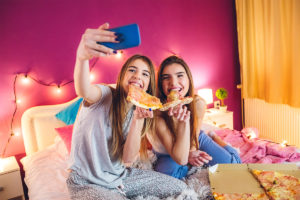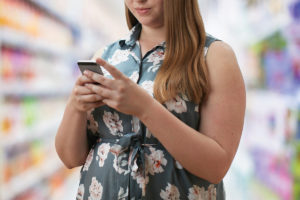Technology
Cybersecurity Tips and Strategies
Outsmart the scammers with these risk management tools and techniques that will help you improve your cybersecurity.
Cooking Course Can Improve Wellness
A study found people who participated in a 7-week healthy cooking course using a mobile food kitchen reported better mental health.
Food Apps Reduce Junk Food Intake
Perhaps a few taps on a smartphone with food apps can help people zap some unhealthy foods from their diets, says a study.
Smartphones and Poor Eating Habits
Is there a link between smartphones and poor eating habits? Teens who spend more than 2 hours/day on their phones are less likely to eat fruits and veggies.
The Copycat Diet
It appears we are more likely to follow the food habits we see portrayed most often on social media sites, according to research.
July 2020 Question of the Month: Are Apps a Weight Loss Winner?
For clients whose primary health focus is to shed a few pounds, perhaps directing them toward a wellness-oriented app could help them nail this goal.
Mobile Apps Aid Weight Loss
Mobile phones are a cozy home for apps with a range of functions, from calling for a ride to recording diet and exercise histories.
Do It for the ‘Gram
Instagram’s billion active monthly users and 500 million active weekly users demand your attention. If you’re doing any marketing for your gym or fitness studio, it’s a platform you can’t afford to ignore.
But, being strong on the 'gram doesn’t have to dominate your time.
Excellent Customer Service in the Digital Age
What has changed with customer service in the last decade, and certainly in the last five years? The intersection of customer service and technology. Nowadays, clients interact more with devices, apps and platforms than they do with a live person. In many instances, these online interactions make for rapid, efficient service.
Virtual Group Fitness Classes
Exercising in front of a television, computer screen or mobile device is nothing new. Since the advent of VHS tapes, fitness programs have offered users an opportunity to get their sweat on whenever they choose in the comfort of their home. Over the past several years, however, fitness facilities have leveraged new technology to offer virtual classes on-site in hopes of luring exercisers out of their living rooms and into the group exercise room.
November 2019 Question of the Month: Is Social Media a Nutritional Black Hole?
Nutrition advice from social media “experts” is best viewed with a huge grain of Himalayan pink salt, says new research presented at this year’s European Congress on Obesity. British researchers at the University of Glasgow recently combed through popular U.K. nutrition and weight loss blogs to determine how much of the advice being dished out was trustworthy. The social media influencers were graded on transparency, nutritional soundness and use of research-backed references.
To Break the Sugar Habit, Dial Down the Blue Light
Being glued to your smartphone at night may not be so smart if you’re trying to stick to a healthy diet. In research presented at the 2019 conference of the Society for the Study of Ingestive Behavior, in the Netherlands, rats exposed at night to just 1 hour of blue light—the same type of light emitted by many digital devices like smartphones—consumed more sugar afterward than when they were not exposed to blue light at night.
Could Gaming Help People Eat Better?
As we become better informed about the potential pitfalls of too much screen time, findings in the Journal of Behavioral Medicine suggest that sitting in front of a computer to play a diet-focused game may drive people to trade in their candy for cauliflower!
Providing Excellent Customer Service in the Digital Age
Outstanding customer service has always been the number-one way to attract and retain customers, clients and members. In recent years, the notion of great customer service has changed as a result of high expectations from informed consumers. This switch has occurred in large part because people can “connect” with a company easily and quickly through a multitude of channels, both offline and online.
Embrace the Future of the Fitness Industry
The fitness industry has never been so exciting, and there is so much renewed interest in wellness and our collective desire to seek optimal health. The concept of a “traditional gym” has slogged it out for about 50 years, starting in community halls and evolving into big-box gyms, budget clubs and boutique studios. Adjacent industries—such as entertainment, health, athleisure, franchising, food and hospitality, social media and gaming—are investing money.
The World’s No. 1 PT & Coaching Software
IDEA has the pleasure of introducing to its valued members the world’s number-one personal training and coaching software, My PT Hub.
Since 2015, My PT Hub has grown to become the No. 1 software tool enabling Personal Trainers to manage their entire fitness business. The software has a vast and extensive set of features that have been carefully designed and crafted by personal trainers, for personal trainers.
Optimizing Your Fitness Site for Sales
Nowadays, a top item on an entrepreneur’s to-do list is building a website. It’s no secret that consumers do their research online before making a purchase decision. They search for information about fitness services and then weigh their options, comparing what you offer to what your competitors provide.
So, yes, your business needs a website.
Social Media Influencers Give Inaccurate Health Advice
Have you been frustrated by bad health and fitness advice doled out by social media influencers? You’re not alone, and if you sense that much of the popular online health information is wrong, you’re right! A recent study of key U.K. social media influencers’ weight management blogs—presented at the European Congress on Obesity in Glasgow, Scotland, in April 2019—showed that most influencers were not reliable weight management resources.
Put Down the Phone While You Grocery Shop
It’s not a good idea to be a distracted driver when pushing your shopping cart. A study with modern-day relevance found that people who used their phones for “shopping-unrelated” tasks—like scrolling through a social media feed or volleying text messages with a friend—purchased more unplanned items than people who didn’t use their phones while grocery shopping. And were those items a head of broccoli or a pint of blueberries? No, the purchases were mostly nutritionally poor, packaged foods.



















